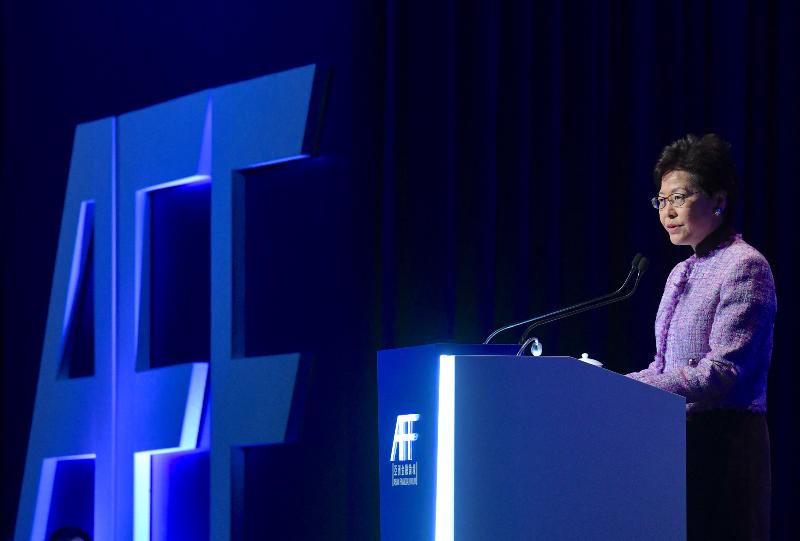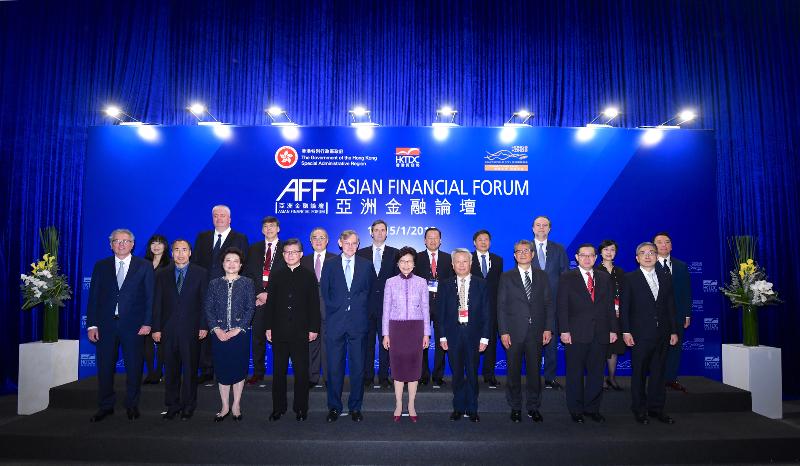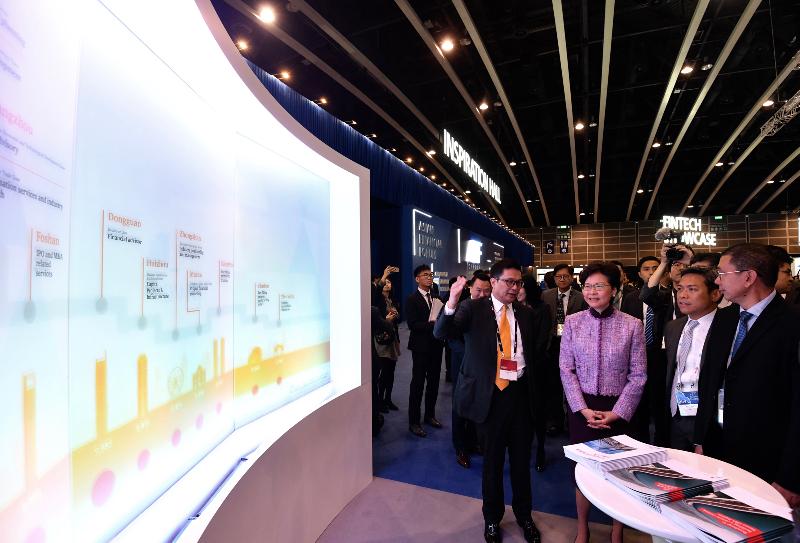Speech by CE at Asian Financial Forum 2019 (English only) (with photos/video)
*****************************************************************************
Vincent (Chairman of the Hong Kong Trade Development Council, Mr Vincent Lo), your excellencies, distinguished guests, ladies and gentlemen,
Good morning. On behalf of the Hong Kong Special Administrative Region (SAR) Government, I extend to all of you a very warm welcome to this year's Asian Financial Forum. Since its inception in 2007, AFF has been growing in size and influence, and it is now a highlight in our events calendar. I'm delighted that this year, over 3 300 policymakers, business and financial leaders as well as investors from more than 40 countries and regions are joining us to explore opportunities, do deals, make connections and, ultimately, find innovative ways to excel in 2019.
That, of course, will be a considerable challenge. This new year is already charged with the trade discord between the two largest economies in the world and uncertainties in other parts of the world. For many economies including Hong Kong, moderated growth and for many companies, diminished business and financial results in 2018 appear inevitable. However, for Hong Kong, I believe there are more opportunities than challenges, or put it another way, by leveraging on our solid foundations and proactive policies, we could turn some of those global challenges into our opportunities. And our financial industry, which contributed almost 19 per cent of our GDP in 2017, is well placed to serve the economy.
Indeed, Hong Kong is a city built on finance and possesses the singular good fortune to create opportunities both within the Mainland and the world at large. The results of that unique advantage are clear and compelling. We are among the world's top three international financial centres, in good company with New York and London. Our stock market boasts the world's sixth largest capitalisation at US$3.8 trillion, which is about 11 times our GDP. In 2018, we topped the world in initial public offerings (IPOs), taking in some US$37 billion. It should not come as a surprise because since 2009, Hong Kong has taken the first place globally in IPO funds raised for six out of the 10 years.
We are Asia's second largest international banking centre behind only Japan, and home to over 75 of the world's 100 top banks. Our asset and wealth management sector manages about US$3.1 trillion, two-thirds of that coming from non-Hong Kong investors. We are, as well, the biggest offshore Renminbi centre in the world, processing more than 75 per cent of global offshore Renminbi payments.
Hong Kong is ranked fourth globally on the ease of doing business, according to the World Bank's Doing Business 2019 Report. That is why over 8 700 overseas and Mainland companies maintain an office in Hong Kong, up 6.4 per cent over the previous year. Among them, 1 530 have chosen to set up regional headquarters here, up 8.3 per cent year on year. Consider, too, foreign direct investment. In 2017, global FDI inflow to Hong Kong totalled over US$100 billion, third in the world. As for outflow, we were fifth.
There's a good deal more I could spotlight in terms of financial figures and results, but allow me, for the next few minutes, to focus on our fundamental strengths, which have brought Hong Kong from a largely regional financial centre 20 years ago to a financial hub of global clout and significance today.
A driving force, of course, has been Mainland China. Through four decades of reform and opening up, the Mainland today is the second largest economy in the world, its GDP soaring to US$12 trillion. But, no less important, Hong Kong has taken full advantage of the opportunities we've been presented with, especially under the unique "one country, two systems" principle since the reunification. We have played an irreplaceable role in the Mainland's success while benefitted significantly in many respects.
Thanks to our competitiveness and adaptability, as well as our long-standing embrace of free and unfettered trade, Hong Kong has been rated as the world's freest economy for 24 years running by the Washington-based Heritage Foundation.
Being a global financial centre for decades has also made Hong Kong China's international financial capital, the only Chinese city to fully develop a market-based financial system, one underpinned by the rule of law and internationally aligned regulatory regimes. This has earned Hong Kong the trust of business from all over the world.
Both Mainland and international investors take confidence in Hong Kong. We add value and create wealth for Mainland enterprises, international investors and, of course, ourselves. In this, we continue to advance, responding to both the development needs of the Mainland and the appetite of international investors. You can see that at work, from the listing of H-shares in Hong Kong in the early 1990s, to the Real Time Gross Settlement system for four currencies - US dollar, Euro, Renminbi and Hong Kong dollar - and the Renminbi-denominated financial products at the turn of the century. More recently, we've launched Stock Connect, the northbound trading of Bond Connect and, this past year, the new listing regime for companies from emerging and innovative sectors.
We will reinforce our prime role in connecting the Mainland with the rest of the world. Hong Kong is the largest source of realised foreign direct investment in the Mainland, contributing US$95 billion, that's 69 per cent, in 2017. The Mainland is also Hong Kong's second largest source of inward direct investment, contributing 21 per cent, or US$23 billion, in 2017.
Since last May, the daily quotas of northbound and southbound trading under Stock Connect have quadrupled, to RMB52 billion and RMB42 billion respectively. As for the mutual recognition of funds between Hong Kong and the Mainland, aggregate net sales totalled RMB9.6 billion as of last November.
We've been blessed, too, with a strategic location, with half the world's population no more than five hours away by air. It helps, too, that our time zone is neatly situated between that of London and New York.
Our location will pay premium dividends in the decades to come, thanks to the Guangdong-Hong Kong-Macao Greater Bay Area - a regional development of national strategic importance consisting of some 70 million population and already a GDP of US$1.5 trillion. The fast-emerging development as well as the recently commissioned cross-boundary infrastructure have linked Hong Kong to Macao and nine cities in Guangdong Province into a Bay Area that will, over time, rival that of the bay areas of Tokyo and New York in economic might. With the ambition to develop an international innovation and technology hub, our Bay Area has been described by some as combining Silicon Valley with New York City.
Then there's the Belt and Road, an ambitious, multi-dimensional, multilateral initiative highlighting increases in infrastructure, finance, trade and commerce as well as people-to-people bonds. The Belt and Road infrastructure will increase demand for project financing and insurance in managing financial, legal, political and regulatory risks.
Hong Kong is well placed to serve as a premier financial and risk-management centre for the Belt and Road's big-ticket projects. The Hong Kong Monetary Authority's Infrastructure Financing Facilitation Office brings Belt and Road project owners and investors together. And, just last month, our Insurance Authority launched the Belt and Road Insurance Exchange Facilitation platform. This platform is a clearing house for information and assistance. It will help insurance companies make deals with bankers, project managers and others involved in insurance risk for infrastructure projects. In short, Hong Kong has what it takes, and what the Belt and Road needs, to make a palpable difference.
In keeping with this Forum's theme, "Creating a Sustainable and Inclusive Future," the Hong Kong SAR Government also places a high priority in developing our economy on a sustainable basis, and on becoming a regional hub for green finance. Our inaugural government green bond will soon be issued. It comes with a borrowing ceiling of HK$100 billion - that's nearly US$13 billion.
Financial technology is high on our priority as well. We are convinced it will help sustain growth and enhance competitiveness in our financial services sector. And we are moving rapidly to build our fintech industry. At last count, more than 500 fintech companies and start-ups were based here. We are reaching out to fintech partners all over the world - from the Middle East, Europe and South America to Shenzhen, our neighbour in southern China. Indeed, in early November last year, Hong Kong's annual Fintech Week, which attracted more than 8 000 fintech players, became the world's first cross-boundary fintech event, with the final day taking place in the city of Shenzhen.
Last September, we launched our Faster Payment System. It connects banks and stored-value facility operators, enabling real-time credit transfer and direct-debit services between merchants and customers, as well as peer-to-peer transfers through the system. It marked a significant step forward for e-payment in Hong Kong. We'll take another e-giant step soon, with the establishment of virtual banks here. The Hong Kong Monetary Authority is expected to issue its initial batch of virtual bank licences in this quarter. These and other fintech services can only help drive competition, creating value and promoting financial inclusion.
The more immediate vision, certainly for the world at large, is somewhat less grand, as I mentioned at the outset. In recent months, the world economy has been affected by trade friction between the Mainland of China and the United States. Investors are also anxious about the pace of monetary policy normalisation in major economies, as well as Brexit's rocky road, geopolitical conflicts and a good deal more.
Hong Kong, one of the world's most open economies, will inevitably be affected by these and other external factors, particularly those that relate to the Mainland economy. It's why we accord the highest priority to ensuring financial stability and the integrity of our financial systems and markets.
Our linked exchange rate system is rock solid, underpinned by more than US$400 billion worth of foreign exchange reserves. Our banking system is resilient and well capitalised, with total capital ratio at about 20 per cent, well above international standards. The smooth operation of our capital markets is guaranteed through robust regulatory oversight and a host of contingency measures. Stress tests have and will continue to be conducted to ensure that we are fully prepared for different circumstances. The International Monetary Fund, I'm pleased to note, has just given us a clean bill of health, a vote of confidence in the resilience of our economy, as well as the integrity and reliability of our financial system.
Investor sentiment had been affected, of course. That's evident in the stock market's increased volatility. Nevertheless, our economy grew 3.7 per cent in the first three quarters of 2018. Economic growth for 2018 as a whole is forecast at 3.2 per cent, which is higher than the trend growth rate in the past decade for the second consecutive year. And our unemployment rate remains at a 20-year low of 2.8 per cent. In short, we are performing as well as can be expected, given the uncertainties of the global economy. No less important, we are prepared for shifting economic and political tides.
The Asian Financial Forum, strategically taking place in the middle of the first month of the new year, is designed to help you plan for contingencies and to help you gather financial and market insights from distinguished speakers and participants from all over the world. For me and members of my delegation attending this year's World Economic Forum at Davos later this month, it helpfully provides a warm-up to a global exchange. I'm sure the Asian Financial Forum, over these two days, will prove invaluable for you and your business and investment strategies. I'm confident, too, that Hong Kong can help you in considering and capturing regional and global opportunities.
I wish you the best of business in 2019. Thank you very much.
Ends/Monday, January 14, 2019
Issued at HKT 11:40
Issued at HKT 11:40
NNNN





